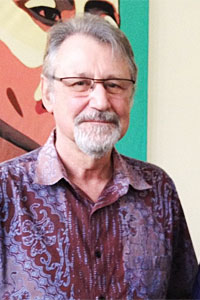
Myanmar's State Counsellor and Foreign Minister Aung San Suu Kyi starts an official trip to Thailand Thursday which underlines the importance of geopolitics and the role of this immediate neighbour in the country's development.
It is a highly significant trip, as it is only her second visit abroad since she became foreign minister in April. The Lady visited Laos on a one-day hastily arranged trip in May. But the three-day visit to Thailand is by far the most important step she has taken outside Myanmar as foreign minister -- with several key issues on the table, including the plight of Myanmar migrant workers and displaced persons, the peace process and the special economic zone on their common border, Dawei.
This is the first time a democratically elected Myanmar leader has visited, although the former prime minister U Nu was granted political asylum in Bangkok in 1969 after he was ousted by Gen Ne Win. But this is not Aung San Suu Kyi's first visit to Thailand either -- she came to Thailand three years ago when she was an opposition MP during which she attended the World Economic Forum.
Although these trips are highly symbolic, they set the tone for the country's foreign policy priorities. Diplomats there had urged the Lady not to visit Thailand first, as it would be seen as endorsing the country's military regime. By the same token it was deemed inappropriate to visit Beijing, Tokyo or Washington in early visits.

Larry Jagan is a Myanmar specialist and former BBC World Service News Editor for the region.
The countries of Asia and the West have been clamouring to be the first stop abroad on the new Myanmar government’s itinerary. Greeting foreign ministers in Nay Pyi Taw was not regarded as so contentious, with her Chinese counterpart visiting in April. Since then a host of leaders and foreign ministers from Europe, North America and Asia have trooped through the capital paying their respects to the Lady. Aung San Suu Kyi’s first visit was to have been to Moscow for the Asean-Russia summit, but the visit of US Secretary of State John Kerry put paid to that — as they coincided. But the Lady’s cosy relationship with the West is well known.
This has sent tremors through most Asean capitals, hoping the new democratic government of Myanmar would not now turn its back on Asean or the region. Most Asean countries were slow to welcome Aung San Suu Kyi’s overwhelming electoral victory and feared her strident human rights position may damage their relations with Nay Pyi Taw.
Bangkok was particularly worried that she would prove no friend of Thailand and that their solid bilateral relations, developed under the previous government of Thein Sein, may suffer. According to diplomatic sources, Thailand even considered sending an eminent envoy to see her earlier this year. But it sensibly decided against, and sent the foreign minister after Aung San Suu Kyi was formally named state counsellor and foreign minister in April.
But according to diplomatic sources in the region, there was still some concern about the new government's attitude to the region. This concern was also deeply felt within Myanmar's Ministry of Foreign Affairs, and diplomats went to great pains to encourage the new government to continue at least partially Thein Sein's Asean-first approach. That was the reason the trip to Laos was hastily arranged -- at Myanmar's initiative -- but readily accepted by Vientiane. Although Aung San Suu Kyi is anxious to ally fears in the region, especially Thailand, this visit to Bangkok is a practical trip -- as the new Myanmar government is anxious to resolve many bilateral issues, which will have an impact on the country's future development.
Of course the top issue is certainly Myanmar migrant workers, and some 120,000 displaced persons who have fled across the Thai border for sanctuary. A bilateral agreement Thailand is expected to be signed during the visit, on the status of the migrant workers in. Other migrant issues and the position of the displaced persons are also expected to be discussed. Aung San Suu Kyi is due to visit Mahachai this afternoon where she is to meet thousands of Myanmar migrant workers and Tham Hin camp in Ratchaburi on Saturday. The camp visit was cancelled due to bad weather. Last time she was here, three years ago, she also visited Mahachai and later talked to displaced persons in Mae Sot. Of course the return of the refugees will depend on the peace process. Thailand has been supportive of the peace talks and the signing of the national ceasefire agreement last year behind the scenes during Thein Sein's government. While it may not be strictly Asean-first as in the case of Thein Sein, the new government is a strong reaffirmation of Myanmar's previous foreign policy principles under the previous civilian government of U Nu, some 60 years ago, of non-alignment.
The new government's policy is one of independence and non-alignment, the National League for Democracy leader, Tin Oo, said recently. "But it may have to be adjusted to meet present realities," he added. This can only be good news for Thailand, Asean and the region.
